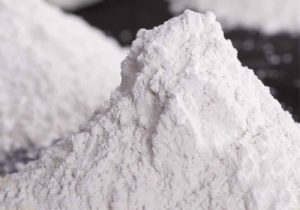
CP-EW organoclay for water based paint
CP-EW Organoclay for Water Based paint. It is primarily employed in water borne paint systems,such as latex paint. So it is a good water based additive in paints,coatings,grease etc.
Anti settling agent for water based paints :It is a anti sagging agent in paint.But it’s different with anti settling agent for solvent based paints. Of course, we can provide you with these two different types of anti settling agents used in water-based and solvent based paint systems.
Looking at the R&D personnel of the corresponding companies, most of them have more than 20 years of experience in Anti settling agent for water based paints R&D and practice. The professional engineer team has made great contributions to the field of organoclay bentonite.Anti settling agent for water based paints

CP-EW Organoclay for Water Based paint. It is primarily employed in water borne paint systems,such as latex paint. So it is a good water based additive in paints,coatings,grease etc.

CP-EWS Modified bentonite It is employed in a water-borne coatings system. CP-EWS organoclay outperforms CP-EW in terms of thixotropy, transparence, and dispersion.

CP-WBS Rheology Modifier is rheological modified bentonite. It is mostly employed in water-borne systems.


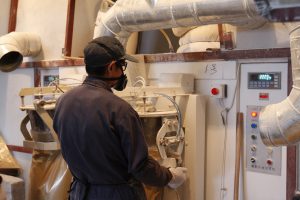
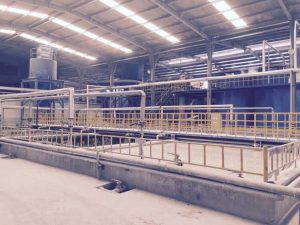

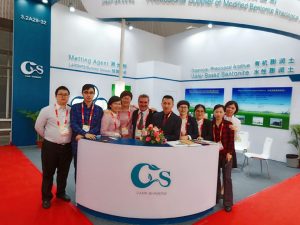
The Anti settling agent for water based paints -specialized Zhejiang Camp-Shinning New Material CO.,LTD. and Hangzhou Camp-Shinning CO.,LTD. are subsidiaries of Camp-Shinning.
Camp-shinning concentrated on high value-added, high-technology organo bentonite series products, particularly in research, development, manufacturing, and sales of organic (solvent based organoclay) and inorganic bentonite (water based organoclay).
Our Organophilic bentonite clay finds widespread application in oil drilling mud, paint, coating, lubricating grease, adhesive, construction mortar, cosmetics, and waste water treatment, among other applications. A group of world-class professional users and distributors, such as SUN CHEMICAL,,SIEGWERK,LEHMANN &VOsS, and others, have acknowledged our dependable quality.
Current annual production of organic bentonite clay | organoclay is 20,000 metric tons, while refined bentonite production is 15,000 metric tons.
Our ISO 9001 quality system certification and IS014001 environmental management system certification, as well as our own mine with superior ore quality and production of proprietary technology, ensure the long-term quality and supply stability of our Organoclay bentonite | Organophilic clay.
Our mission is to provide users with superior Organoclay bentonite | Organophilic clay and services and to collaborate with them to achieve success and glory.
Internet address: https://www.rheologymodifiers.com/ and email address: [email protected]
Whatsapp / Wechat: +86-13185071071
Anti settling agent for water based paints supplier
Internet address: https://www.rheologicaladditive.com/ and email address: [email protected]
Whatsapp / Wechat: +86-13185071071
Paint with Organoclay Anti-Settle Agent
If you are considering utilizing organoclay as an anti-settling ingredient in your paint, there are several aspects that you should bear in mind. Depending on the application, these compounds can have varied levels of performance. They are frequently employed in the manufacturing of traffic paints and drilling fluids.
CP-APA
CP-APA is an organoclay anti-settling compound that is commonly used in solventborne coatings. It enhances brushability as well as pigment dispersion. It can be used in place of polar activators and at any stage of the paint manufacturing process. This ingredient is very useful for coatings used for spraying or dipping.
The shelf life of CP-APA is two years, and it is ISO 9001/9002 certified. Because the agent is natural, it has little or no odor.
Anti settling agent for water based paints
The invention’s anti-settling agent composition can be used in aqueous paints containing acrylic, alkyd, polyester, urethane, or amino resins. This ingredient can be included into aqueous paint at a rate ranging from 0.05 to 2.0% by weight, depending on the kind.
Polyamide has a strong cohesive force but is incompatible with heterogeneous materials. As a result, polyamide can cause dispersion issues in paint applications. It can also cause the polymer and polyamide to separate. As a result, the anti-settling component in the paint is inadequately disseminated. As a result, many paint producers choose the use of an organoclay anti-settling ingredient.
Paints benefit from the usage of organo bentonite as an anti-settling agent. While it has some limits, it also offers many advantages. Aside from its outstanding anti-sagging capabilities, it also improves the coating’s film and thixotropy properties. This agent also does not yellow or alter color. Its distinct rheological qualities make it an excellent anti-settling agent.
This mixture can be used in aqueous paint as an anti-settling agent. It can also be used with other additives and materials. It can be employed as an anti-fouling agent, a thickening agent, or an anti-static agent, for example.
It has good dispersibility when added directly to paint, in addition to its anti-settling qualities. When mixed into paint, this chemical increases pigment dispersion. Because of its dispersibility and anti-settling qualities, it is also ideal for use in water-based paint.
Anti settling agent for water based paints
Organoclay bentonite, also known as organic bentonite clay, is a type of anti-settling ingredient that is used in the production of paints and coatings. The clay is made up of natural montmorillonite and quaternary ammonium salts. It can be mixed into paint as a pre-gel or directly into the paint.
Organoclay is a white powder that is utilized in a wide range of industrial applications. Its color is determined by the type of raw bentonite ore utilized. It has several applications, including reducing sedimentation and improving adhesion in oil fields.
CP-34 Anti settling agent for water based paints
CP-34 organoclay is an organic paint anti-settling agent. It is a surface active, aromatic-free agent. It is suitable for a wide range of coating methods, including spray and dipping varnishes. Because of its lengthy shelf life and ability to retain activity, it is a good candidate for use in paints.
The anti-settling agent’s principal function is to keep the pigment from hardening and drying too soon.
Paints contain a variety of anti-settling additives, including organic bentonite, polyolefin particles, and fumed silica. All serve the same fundamental purpose: to raise the viscosity and homogeneity of a paint system while delaying pigment solidification.
Color and clarity are improved, brush markings are reduced, and anti-settling performance is improved with CP-34 organoclay.
Another sort of anti-settling ingredient that can be more active in the paint process is organobentonite. However, most bentonite in paint is only used as a general filler, which raises the cost.
As a result, bentonite should be soaked and pulped before being mixed into the paint. The pre-soaking and pulping processes help to maximize the bentonite’s efficacy. The suggested dosage is two to three percent of the overall volume of the paint.
A form of clay material called organoclay has been treated with organic compounds, particularly cationic surfactants. It is a fine, white powder that has many uses, such as a lubricant, reinforcement material for plastics, and a rheology modifier for paints and coatings.
Due to its distinctive features, organoclay has since gained prominence in a number of industries. The capacity of organoclay to enhance the mechanical properties of a variety of materials, such as polymers, elastomers, and thermoplastics, is one of its main benefits. Organoclay serves as a reinforcing agent when applied to these materials, increasing the final product’s strength and stiffness.
Additionally, organoclay has good rheological characteristics that make it ideal as a coatings and paints thickening agent. Organoclay can enhance the flow and leveling characteristics of a liquid, producing a smoother and more consistent finish. By minimizing ingredient separation, organoclay can also increase a product’s stability and shelf life.
Anti settling agent for water based paints is utilized in numerous additional applications in addition to coatings and polymers. For instance, it serves as a lubricant in drilling fluids, a filter assist in the extraction of oil and gas, and a support for catalysts in chemical reactions.
The process of intercalation, in which the organic molecules are introduced between the layers of clay particles, is one of the main ways to create organoclay. Several techniques, including mechanical grinding, chemical intercalation, and heat treatment, can be used to carry out this operation. The precise characteristics wanted in the finished product will determine the sort of procedure to be utilized.
The type and quantity of organic molecules employed in the intercalation process can be changed to alter the properties of organoclay. For instance, adding more organic molecules can cause more intercalation, which might enhance the material’s mechanical and rheological qualities.
Compared to conventional clay materials, organoclay provides a number of benefits, such as better compatibility with a variety of materials, greater processing and handling properties, and improved environmental stability. It can also be tailored to match the unique requirements of a particular application and is relatively simple to make.
Using Anti settling agent for water based paints could have certain disadvantages despite its many advantages.
The possibility of the organic molecules employed in the intercalation process being released, which can have detrimental effects on the environment, is one cause for concern.
Additionally, because of its propensity to absorb water and potentially cause changes to its physical and chemical properties, organoclay might not be appropriate for use in some applications.
In general, Anti settling agent for water based paints is a flexible material with several uses in a range of sectors. It is a crucial material for enhancing the performance of a wide variety of products due to its distinctive combination of mechanical and rheological qualities.

CP-992 Organophilic Clay, the wet process improved viscosifier and gelling agent . It is a rapidly dispersing.

CP-982 Organophilic Clay is an amine treated bentonite with a moderate temperature performance.

CP-150 Organophilic Clay is a self-activating organoclay that disperses easily and performs well in diesel, low aromatic mineral oil, modified vegetable oil, and synthetic base fluid formulations.


CP-10 organoclay is a rheological additive made of organoclay. It is used in non-polar to moderately polar aliphatic and other solvent systems

CP-MPZ organoclays is an modified bentonite that is used in solvent and resin systems ranging from non-polar to highly polar.

The CP-MPS rheology modifier is a type of organo clay rheological additive that is used in solvent and resin systems ranging from non-polar to high polarity.
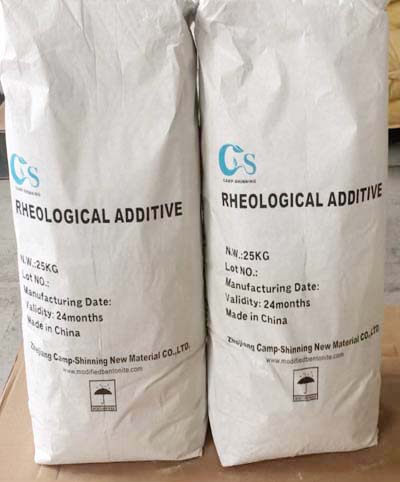
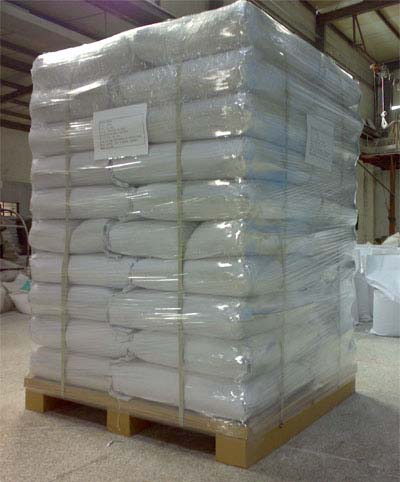
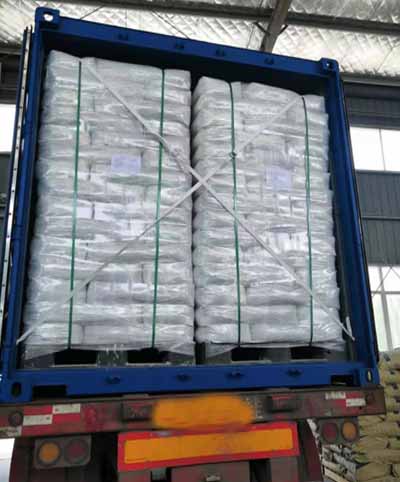
Organoclay Supplier / Manufacturer :
Internet address: https://www.rheologymodifiers.com/
Email address: [email protected]
Whatsapp / Wechat: +86-13185071071
Organophilic Clay Supplier / Manufacturer :
Organoclay Supplier / Manufacturer :
Internet address: https://www.rheologymodifiers.com/
Email address: [email protected]
Whatsapp / Wechat: +86-13185071071
Organophilic Clay Supplier / Manufacturer :

CP-180 organoclay is an organo clay rheological additive (modified montmorillonite) designed specifically for use in solvent-based systems

CP-34 organoclay is a modified bentonite that has been specifically designed for use in solvent-based systems.

CP-EDS modified bentonite is a kind of organo clay rheological additive. It is used in systems of medium polarity and high polarity system.
Anti settling agent for water based paints